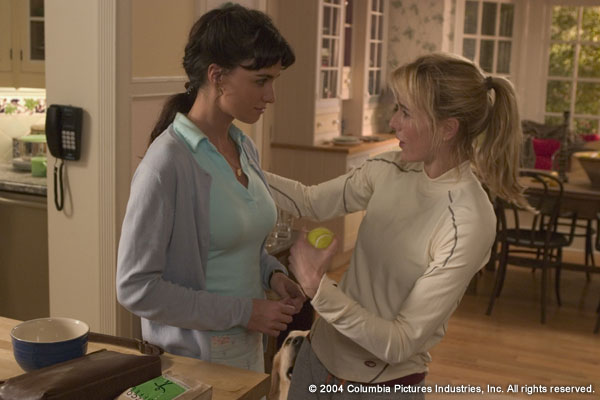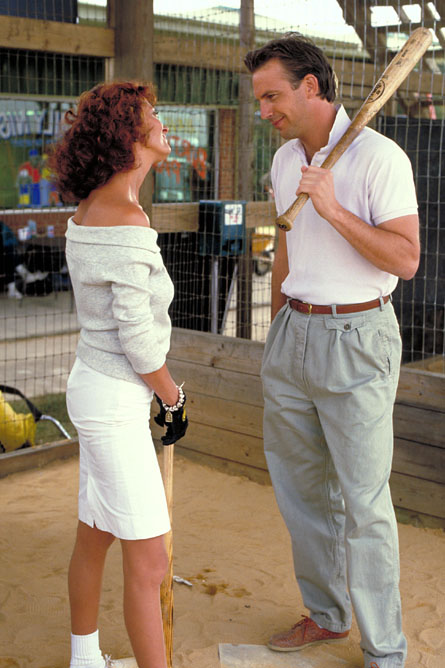From the Chicago Reader (December 17, 2004). I’m wondering now (August 2015) whether I underrated Spanglish as much as I overrated As Good As It Gets. But the fact that I keep changing my mind about James L. Brooks probably says as much about me as it says about him. (In March 2016, having just reseen this, I like it still more, although, as always with Brooks, some irritations remain.) — J.R.

Spanglish
** (Worth seeing)
Directed and written by James L. Brooks
With Adam Sandler, Tea Leoni, Paz Vega, Cloris Leachman, Shelbie Bruce, Sarah Steele, and Ian Hyland

One reason I can’t regard Pauline Kael as a great film critic is her unshakable belief that she needed to see a movie only once — that she could immediately form an opinion and never have to revise it. She was thought of as an industry gadfly, but her blind faith in first impressions often fit industry calculations perfectly, helping to validate things like test-marketing and seeing movies as disposable.
I readily admit that changing one’s mind about movies days or years later can also be a problem. But we outgrow some films and mature enough to value the challenges of others. Read more
Written for Film Comment‘s web site in mid-August 2016. — J.R.


Although it isn’t widely recognized, Melbourne’s historical status as the cradle of online film criticism — as signaled by the founding of Screening the Past in 1997, Senses of Cinema in 1999, and Rouge in 2003 — remains a significant part of its film culture, so highly developed and serious that not once, during fourteen festival screenings, did I ever notice any viewers activating their mobiles. It’s equally evident that the pioneering web sites which helped to foster this kind of seriousness were neither accidental nor coincidental. All three were calculated gestures of outreach from a remote outpost to the rest of the world — allowing everyone a glimpse into a literary culture and a branch of cinematic savvy unhampered by the twang of regional accents or the pressure of imminent local releases. And as outreach gestures they no less clearly succeeded and flourished — so well, in fact, that their innovations and energies were quickly absorbed into the Internet mainstream without leaving behind many telltale markers of where they’d been nurtured. (If the Internet sometimes fosters historical blindness, this is especially true of the Internet’s own history.) Read more
From the Chicago Reader (July 1, 1988). Criterion has released an elaborately bonus-filled Blu-Ray of this comedy. — J.R.

BULL DURHAM
*** (A must-see)
Directed and written by Ron Shelton
With Kevin Costner, Susan Sarandon, Tim Robbins, Trey Wilson, Robert Wuhl, and Jenny Robertson.


I cannot tell a lie: Bull Durham gave me so much old-fashioned moviegoing pleasure the first time around, in spite of my complete lack of interest in baseball, that I wasn’t too concerned about the sources of my fun. Entertaining movies are often deft at discouraging reflection. But two weeks later, when I went back to see this one again — mainly to refresh my memory — I came out feeling a little embarrassed about how and why I’d been taken in.
It’s not that the movie doesn’t have its share of singular virtues, especially considering that it’s Ron Shelton’s first feature as a director (he also wrote the script). Genuine star performances — as opposed to those in hyped-up vehicles like Big, Red Heat, The Presidio, and Big Business — are not all that commonplace these days, and Shelton gets them here from both Kevin Costner and Susan Sarandon. He also strikes a very satisfying balance between the fast and furious dialogue — much of it slangy, staccato jargon that reflects Shelton’s ball-playing background — and the transitional montage sequences, overlaid with pop songs, that allow us to glide and drift between the gabfests. Read more






